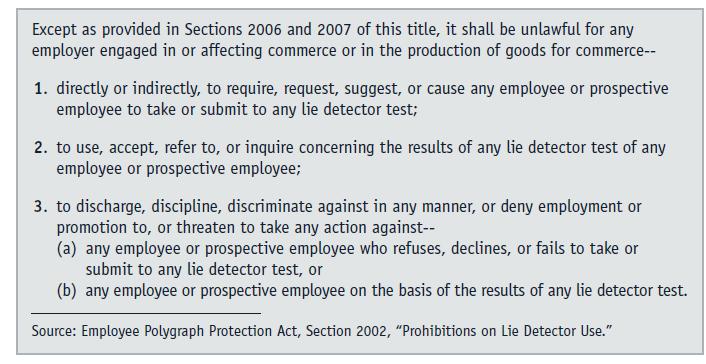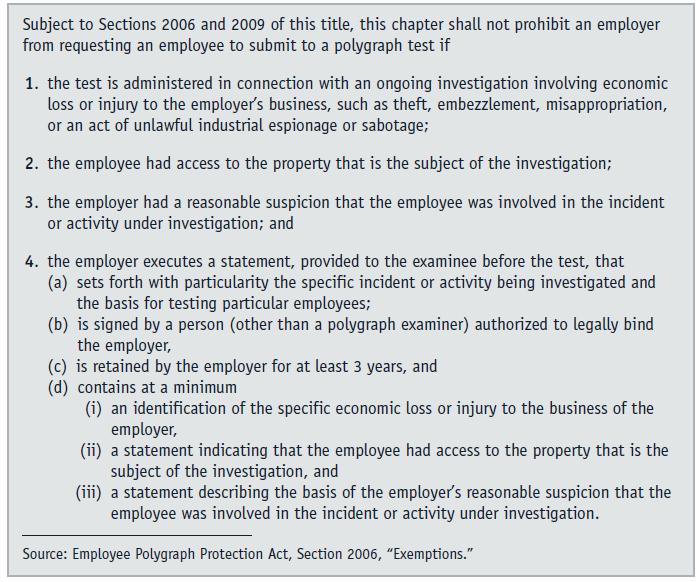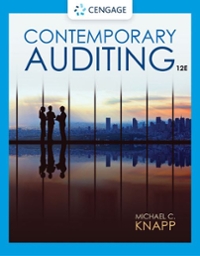Cash shortages had been a recurring problem for Blakely's Fourth Street store. Over the previous 12 months,
Question:
Cash shortages had been a recurring problem for Blakely's Fourth Street store. Over the previous 12 months, Martin Carrington had reported four shortages, each exceeding $200, to Thomas Blakely, the principal owner of Blakely Markets. The cash shortage Rose Holly discovered was the first that could be tracked to a specific cash register and a specific time of day.When Rose reported the missing $210 to Carrington, the frustrated store manager slammed his fist on his desk. "What is going on here?" he shouted."I counted my till when I left for lunch. Just like I always do," Rose responded timidly."Then, when I got back-""Rose, I'm not accusing you. But this has to stop." A shaken Rose regained her composure and continued. "When I got back, I noticed that someone had been using register three. Kathryn said it was Winston.""Winston," Martin muttered under his breath in disgust."So, I counted my till. Twice. Each time, I came up short by $210.""Stay here, Rose. I'm getting to the bottom of this right now." Carrington marched to aisle eight, where Winston was stocking and told him to come to his office. When Winston asked why, the store manager snapped, "You'll find out soon enough." Carrington's frustration stemmed from mounting pressure Thomas Blakely was applying on him to tighten the Fourth Street store's internal controls. Each time Carrington reported a cash shortage, Blakely exploded. "We're barely making ends meet as it is!" Blakely had bellowed on the previous occasion that Carrington had reported an apparent theft of cash.Increasing competition from national grocery chains had been steadily eroding Blakely's revenues and profits over the past decade. Residents of the small towns in which Blakely's stores were located often drove to a nearby metropolitan area to take advantage of the lower prices and greater variety of merchandise offered by national grocery chains. Blakely's gross profit percentage hovered at an anemic 10 percent, meaning that the Fourth Street store needed to produce $2,000 of revenues to replace the gross profit lost due to a $200 theft. The gross profit percentage for comparable grocery chains ranged from 18 to 25 percent.At the same time Thomas Blakely was demanding Martin Carrington eliminate the Fourth Street store's theft losses; he was also slashing the store's operating budget.During the past year, Carrington had trimmed the store's payroll by several employees.Carrington realized that reducing the store's staff during each work shift and assigning additional job responsibilities to each employee provided dishonest subordinates with more opportunity to take advantage of the business. But when he tried to make that argument to Blakely, the owner refused to listen."Doesn't matter how many or how few employees you have since honesty is a part of everybody's job description," Blakely had once barked at Carrington.After returning to his office with Winston Schmidt in tow, Carrington told Rose and Winston that he was calling the police. Carrington asked the police to dispatch an officer to the Fourth Street store to investigate the apparent theft. Carrington then telephoned Thomas Blakely. As expected, the unpleasant news detonated Blakely's notoriously quick temper.A few weeks earlier, Blakely and Carrington had spent several hours studying the previous four cash thefts at the Fourth Street store. Three of those shortages had been discovered at the end of the day when an assistant store manager prepared the daily cash deposit. On each of those occasions, the assistant store manager who discovered the cash shortage had been Winston Schmidt. The fourth shortage had occurred at register four on a busy Saturday afternoon. Winston had worked as a relief checker during the shift in which that cash shortage arose, along with three other individuals. Since the exact time the cash shortage occurred could not be pinpointed, the shortage could not be traced to a specific individual.Blakely and Carrington decided that Winston's connection with the four thefts was not a coincidence. The two men later testified that their investigation caused them to "lose trust and confidence" in Winston and to discuss changing his job responsibilities so he would not have access to the store's cash.Thomas Blakely and Officer Natalie Buzzo arrived at the Fourth Street store within one hour after Rose Holly discovered the $210 cash shortage. Officer Buzzo first spoke privately with Blakely. The owner told the police officer about the Fourth Street store's rash of cash thefts over the previous 12 months and Winston's link to each of them. Officer Buzzo then interviewed the Blakely employees on the scene, including Carrington. Although Kathryn Klempnauer reported seeing three "suspicious characters" milling around the candy counter near register three while it had been unattended, Officer Buzzo quickly concluded the theft was likely an "inside job." The officer then decided Winston Schmidt and Rose Holly should take polygraph examinations.Officer Buzzo followed the required procedures for administering polygraph examinations in the case of suspected employee theft. The Employee Polygraph Protection Act (EPPA), a federal statute that applies only to private-sector employers, dictates the procedures to be followed in such circumstances. First, Officer Buzzo obtained the permission of Thomas Blakely, the crime victim, to conduct the polygraph examinations. Next, the officer met with the two suspects, Winston Schmidt and Rose Holly. Officer Buzzo advised the two employees they were not required to take a polygraph test. When she was certain Schmidt and Holly understood their legal rights, the officer asked each of them to take a polygraph test at a later date.


Questions1. The management of Blakely Markets was unfamiliar with the EPPA. Should an organization's internal controls address its need to comply with all relevant state and federal statutes? Or is such compliance beyond the scope of an entity's internal control process? Defend your answer.2. The legal opinion on which this case is based did not describe the internal controls Blakely Markets had in place for its cash processing activities. Visit a local grocery store and observe one or more checkout counters. Develop a list of policies and procedures apparently used by the store to maintain control over its checkout counter operations. For each of these items, identify the apparent control objective.3. What types of duties should be segregated or separated across employees of a small business? What measures can a small business implement if adequate segregation of those duties is not economically feasible?4. What ethical responsibilities do an organization's owners and managers have when they suspect an employee of theft? Should such ethical considerations be integrated into a business's internal control policies and procedures? Explain.5. Do you believe the EPPA improperly limits retail businesses' ability to investigate and prosecute potential incidents of employee theft? Defend your answer.Identify other laws and regulations that have potential control implications for retail businesses.
Step by Step Answer:






